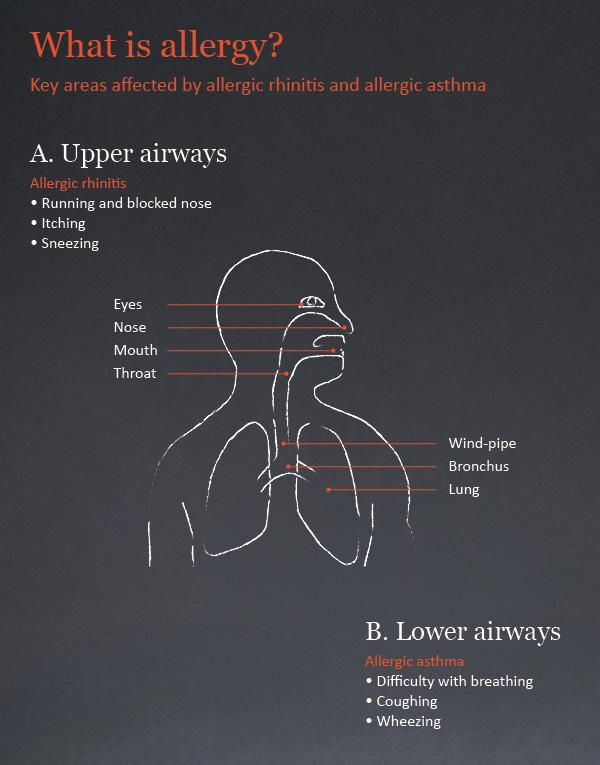Industrialisation and lifestyle changes have had a major impact on the development of respiratory allergies. Allergy immunotherapy can help patients to take control of their allergies by reprogramming their immune system.
An allergy is a medical condition in which the body’s immune system reacts abnormally to a foreign substance. The substance that causes the allergy is called an allergen. Allergy occurs when a person reacts to substances in the environment that are harmless to most people. These substances are known as allergens and are found in dust mites, pets, pollen, insects, moulds, foods and some medications.
An “allergic reaction” is the way your body responds to the allergen. A chain of events occur that result in an allergic reaction.
If you are prone to allergies, the first time you’re exposed to a specific allergen (such as pollen), your body responds by producing allergic (IgE) antibodies. The job of these antibodies is to find the allergens and help remove them from your system. As a result, a chemical called histamine is released and causes symptoms of allergies.
Types of Allergy
Bronchial Asthma: Bronchial asthma is a chronic inflammatory disease of the airways characterized by bronchial hyperreactivity and a variable degree of airway obstruction. It is diagnosed on the basis of the clinical history, physical examination, and pulmonary function tests, including reversibility testing and measurement of bronchial reactivity.

Bronchial asthma is a serious global health problem. 5% to 10% of persons of all ages suffer from this chronic airway disorder.
Bronchial asthma afflicts about 10% of children and 5% of adults.

Allergic asthma occurs when the lower airways are hypersensitive, causing them to become swollen and inflamed. House dust mites are a common cause of allergic asthma.
Conjunctivitis : Pink eye (often called conjunctivitis) is when the conjunctiva is irritated by an infection or allergies. Your eyes are red and swollen (inflamed), and sometimes they have a sticky discharge. You can have conjunctivitis in one or both eyes.
Conjunctivitis can be caused by a virus, bacteria or by allergies. Bacterial and viral conjunctivitis are easily spread from person to person. Allergic conjunctivitis is not contagious.
Allergic conjunctivitis is a type of pink eye that comes from an allergic reaction to pollen, animals, cigarette smoke, pool chlorine, car fumes or something else in the environment. It is not contagious. Allergic pink eye makes your eyes very itchy, red and watery, and the eyelids may get puffy.


G.I.T Allergy
The gastrointestinal system plays a central role in immune system homeostasis. It is the main route of contact with the external environment and is overloaded every day with external stimuli, sometimes dangerous as pathogens or toxic substances.
Clinical symptoms of food allergy may affect not only the digestive tract, but also the respiratory system, skin, or cardiovascular system. They may manifest themselves as gastrointestinal problems, asthma attacks, hives, or anaphylactic shock. Allergic reactions of the gastrointestinal tract may be IgE-independent, mixed, or IgE-independent.
Globally, 400-500 million people are affected by allergic rhinitis, and 10-20% of these have symptoms which are not well controlled. People who experience insufficient effect from symptomatic medication can benefit from allergy immunotherapy.
The duration and severity of rhinitis have a direct influence on the development of allergic asthma and the likelihood of recovering from it.
Just like allergic rhinitis, allergic asthma is a condition that can be triggered by exposure to particular allergens, such as grass pollen, tree pollen, or house dust mites.
Whereas allergic rhinitis causes inflammation and irritation in the eyes, nose and the upper airway, allergic asthma primarily affects the lower airways. Symptoms of allergic asthma include wheezing, chest tightness, shortness of breath and persistent coughing.
Respiratory Disease development more likely among allergy sufferers
Studies show that allergic rhinitis and allergic asthma are closely linked, with nearly half of respiratory allergy sufferers experiencing both. Indeed, many people with allergic rhinitis go on to develop allergic asthma.
Treating allergy and asthma together – As a result, evidence increasingly suggests that, rather than being two separate conditions, allergic rhinitis and allergic asthma are caused by the same allergy and that treating – the allergy – can be beneficial for both conditions.

Continuing legacy of
Late Sh. Nirankar Sharma Ji
AllVac is one of the leading companies in the field of allergen immunotherapy (AIT). We provide innovative products for the causal treatment of IgE-mediated allergic diseases and are one of the market leaders for subcutaneous AIT.
Copyright © 2022 , All Rights Reserved.
Designed and Developed by Easy Solution 360.